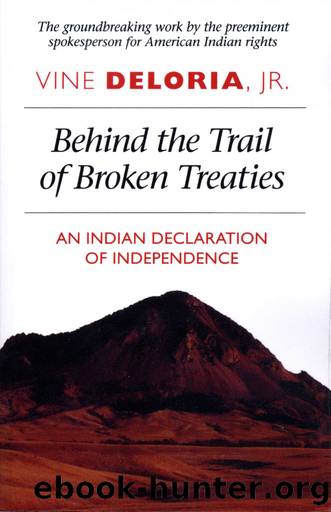Behind the Trail of Broken Treaties by Vine Deloria Jr

Author:Vine Deloria, Jr. [Deloria Jr., Vine]
Language: eng
Format: epub
Publisher: University of Texas Press
8. The Size and Status of Nations
The proposal to restore the Indian tribes to a status of quasi-international independence with the United States acting as their protector strikes most Americans as either radical or ridiculous. In fact, it is neither. The standard objections raised by non-Indians to a fully sovereign status for tribes are generally based upon a misunderstanding of the concept of sovereignty in modern international law and practice, and on a misconception of Indian eligibility for this status because of their previous relationship with the United States government.
Some say that the land areas presently possessed by Indians are too small to qualify as areas over which sovereignty can be exercised. Still others, accepting the small land area, argue that the United States totally surrounds the respective reservations, in effect locking the tribes into its political and economic system whether they wish it or not. The fact that the tribes have a very small population in comparison with other independent states is often pointed out as a reason why the tribes should not have international status.
The tribes’ lack of an independent economic base presently helps to justify the massive federal expenditures which the government yearly makes available to Indian tribes. It is apparent that for the immediate future the United States will have to continue to appropriate large sums of money to keep the reservation people employed and to provide services for them. Can the tribes, people wonder, maintain any form of economic enterprise without the expenditures of the federal government? Would not independence in a political sense doom those programs now operating on the reservations which show some promise of succeeding? And, finally, the fact remains that many tribes lack sufficient education to succeed in the modern industrial society of the United States.
With all of these factors combining to create a tremendous pocket of poverty on each reservation, many non-Indians feel that the present movement to create an international status for the tribes is foolhardy, that the political and social basis for Indian tribal existence would vanish if the tribes were left to go it alone, and that the whole idea is un-American in some fundamental but ill-defined way.
Indians are not seeking a type of independence which would create a totally isolated community with no ties to the United States whatsoever. On the contrary, the movement of today seeks to establish clear and uncontroverted lines of political authority and responsibility for both the tribal governments and the United States so as to prevent the types of errors and maladministration which presently mark the Indian scene.
The assumption of many non-Indians is that independence of a nation implies that it stands in the same position as does the United States toward the rest of the nations of the world. People visualize a standing army, a massive import-export business, tariffs, gigantic administrative bureaucracies, international intrigue, and the ability to wage wars on distant nations with relative impunity. Such indeed are the characteristics of a superpower, but not of the average nation which has recognition as a self-governing community with inherent rights to its own existence.
Download
This site does not store any files on its server. We only index and link to content provided by other sites. Please contact the content providers to delete copyright contents if any and email us, we'll remove relevant links or contents immediately.
| Africa | Americas |
| Arctic & Antarctica | Asia |
| Australia & Oceania | Europe |
| Middle East | Russia |
| United States | World |
| Ancient Civilizations | Military |
| Historical Study & Educational Resources |
The Dawn of Everything by David Graeber & David Wengrow(1691)
The Bomber Mafia by Malcolm Gladwell(1620)
Facing the Mountain by Daniel James Brown(1546)
Submerged Prehistory by Benjamin Jonathan; & Clive Bonsall & Catriona Pickard & Anders Fischer(1452)
Wandering in Strange Lands by Morgan Jerkins(1419)
Tip Top by Bill James(1409)
Driving While Brown: Sheriff Joe Arpaio Versus the Latino Resistance by Terry Greene Sterling & Jude Joffe-Block(1368)
Red Roulette : An Insider's Story of Wealth, Power, Corruption, and Vengeance in Today's China (9781982156176) by Shum Desmond(1350)
Evil Geniuses: The Unmaking of America: A Recent History by Kurt Andersen(1346)
The Way of Fire and Ice: The Living Tradition of Norse Paganism by Ryan Smith(1324)
American Kompromat by Craig Unger(1307)
It Was All a Lie by Stuart Stevens;(1295)
F*cking History by The Captain(1289)
American Dreams by Unknown(1277)
Treasure Islands: Tax Havens and the Men who Stole the World by Nicholas Shaxson(1266)
Evil Geniuses by Kurt Andersen(1249)
White House Inc. by Dan Alexander(1207)
The First Conspiracy by Brad Meltzer & Josh Mensch(1167)
The Fifteen Biggest Lies about the Economy: And Everything Else the Right Doesn't Want You to Know about Taxes, Jobs, and Corporate America by Joshua Holland(1115)
